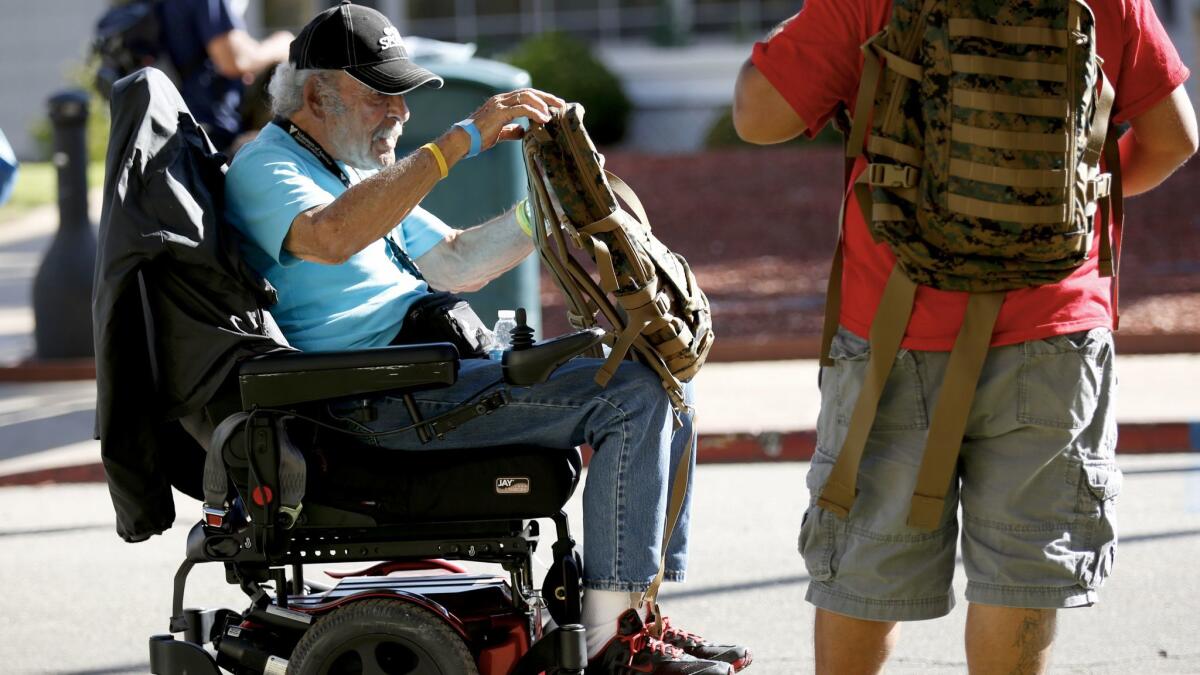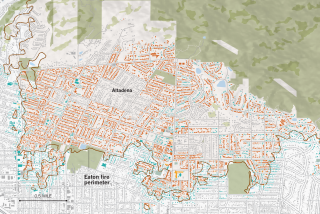More than 1,200 homeless veterans living on Los Angeles streets still need housing

- Share via
More than 1,200 veterans are living on Los Angeles streets, thwarting Mayor Eric Garcetti’s repeated pledges to end the city’s soaring rates of veteran homelessness, officials said Thursday.
Faced with the highest number of homeless veterans of any city in the nation, Garcetti had promised to find housing for every homeless resident who served in the military, first by the end of 2015 and then by last summer.
For the record:
5:04 a.m. Jan. 18, 2025A previous version of this article said that 8,000 homeless veterans had been housed in greater Los Angeles since 2014. That figure refers to Los Angeles city only. The number housed in greater Los Angeles, which includes all of Los Angeles County, is more than 11,000.
An unprecedented infusion of federal rent vouchers and services has helped place more than 8,000 veterans in the city of Los Angeles in homes since January 2014. Still, four to five service members, including those returning from troop drawdowns overseas, land on L.A. streets each day, Garcetti said.
His comments came during a downtown news conference and panel discussion with U.S. Secretary of Veterans Affairs Robert McDonald.
Garcetti said ending veteran homelessness remains his “highest priority,” although he is no longer setting a timetable. The city has launched an ambitious $1.2-billion campaign to build 10,000 units of housing for the homeless by 2026. In addition, a quarter-cent tax proposal to provide $355 million a year for homeless services will be on the March ballot in Los Angeles County.
“Every time we set a goal, we’re getting closer,” the mayor said.
Falling short of the goal is particularly worrisome for housing proponents as the administration of President-elect Donald Trump prepares to take office with a Republican-controlled Congress whose support for social service funding is uncertain. Philip Mangano, who served as homelessness policy czar for President George W. Bush, said market uncertainty following Trump’s election has cast doubt on some plans for homeless housing, including in Los Angeles.
“The mayor is wise in not setting a time frame in Los Angeles. He’s already set two dates; setting a third would not be good,” Mangano said. “The mayor is doing the right thing. [The timetable] was a well-intentioned misjudgment.”
Veterans advocates, however, said a heavy reliance on rent vouchers has put the burden on homeless veterans to find apartments in Los Angeles’ extremely tight and expensive rental market. Many have been forced to look for more affordable housing in outlying communities such as Lancaster, far from the services they need for a successful transition to civilian life. Some have been unable to hold on to their housing.
Advocates also accused local and federal officials of dragging their feet in developing the VA’s 388-acre West Los Angeles campus into homeless housing. As part of a 2015 legal settlement, the agency agreed in principle to turn the Westside’s largest undeveloped property into a residential village for 1,200 veterans.
A later plan included job training, recreational amenities and mental health and substance abuse treatment facilities on the lush grounds, whose buildings had been allowed to sit empty and derelict for decades. A conversion of one of the buildings to 55 units of veterans housing is set to open next month. But veterans advocates contend that VA officials want to limit development to 150 apartments a year.
“More veterans become homeless in a month than their ‘slow growth’ restrictions could accommodate in a year,” said John Aaron, a Vietnam-era veteran and advocate.
McDonald, the VA secretary, said he expected the Trump administration to maintain the same level of homeless aid to Los Angeles, and a VA spokesman said all rent vouchers administered by the county and most of those handled by the city are being used.
Los Angeles is making progress in cutting into veteran homelessness, said Nan Roman, president of the National Alliance to End Homelessness, a Washington nonprofit.
“It cut unsheltered homelessness 43% and veteran homelessness overall 41% in a year, which is unheard of,” she said.
And despite the delays in finding housing for all veterans, McDonald called Los Angeles’ efforts “a national model.”
“We cannot end veteran homelessness nationally without ending it in Los Angeles,” McDonald said.
ALSO
With snow piling up in the Sierra, what will it take to end California’s drought?
Stars visit homes of Debbie Reynolds and Carrie Fisher for reported funeral
Suspect in killings of Long Beach mother, 4-year-old daughter will represent himself at trial
More to Read
Sign up for Essential California
The most important California stories and recommendations in your inbox every morning.
You may occasionally receive promotional content from the Los Angeles Times.











